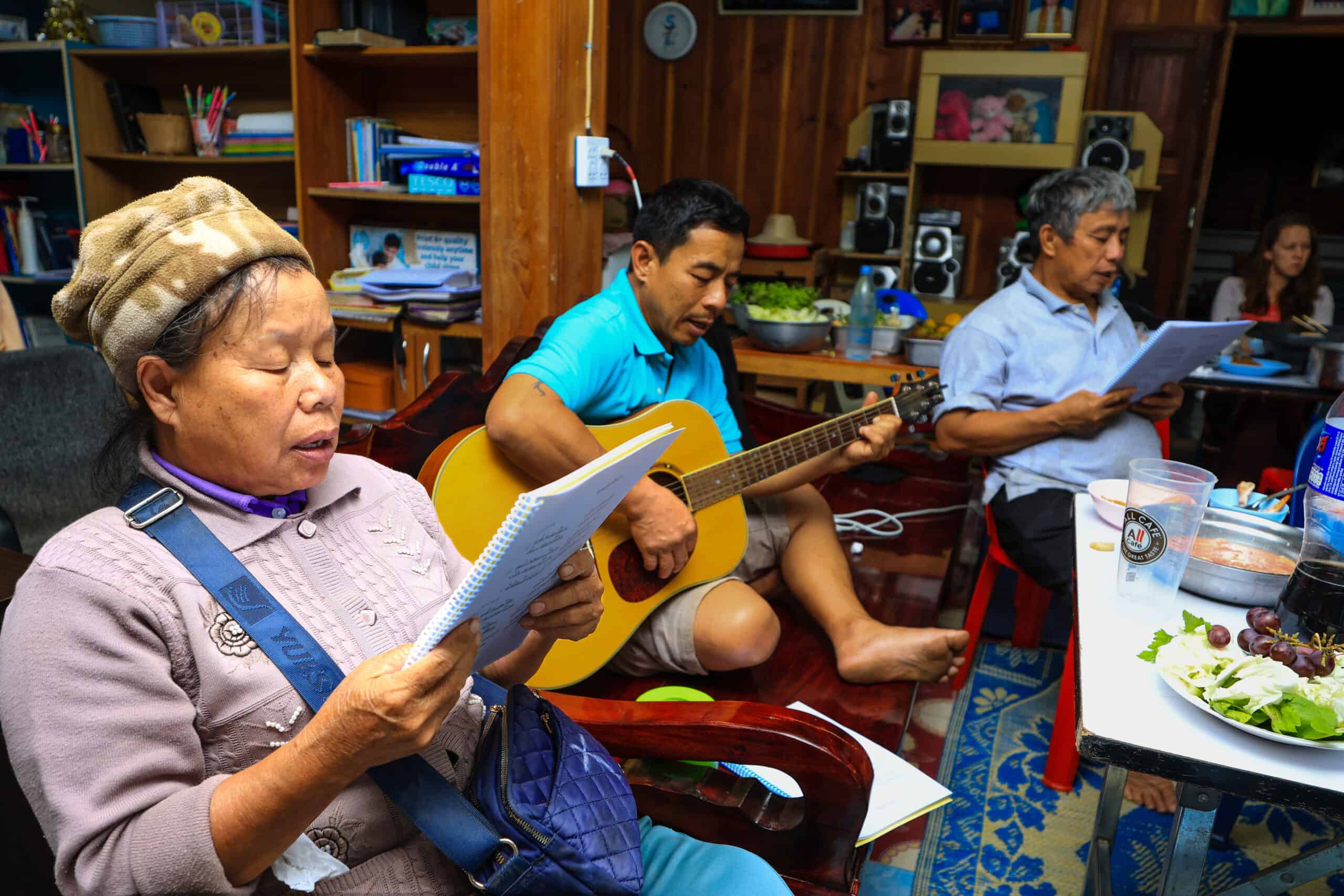Tawan is a translator and Jum is a language helper with the Eastern Lawa Bible translation project in Thailand. They shared their story with a visiting team from Wycliffe Canada in November 2022.
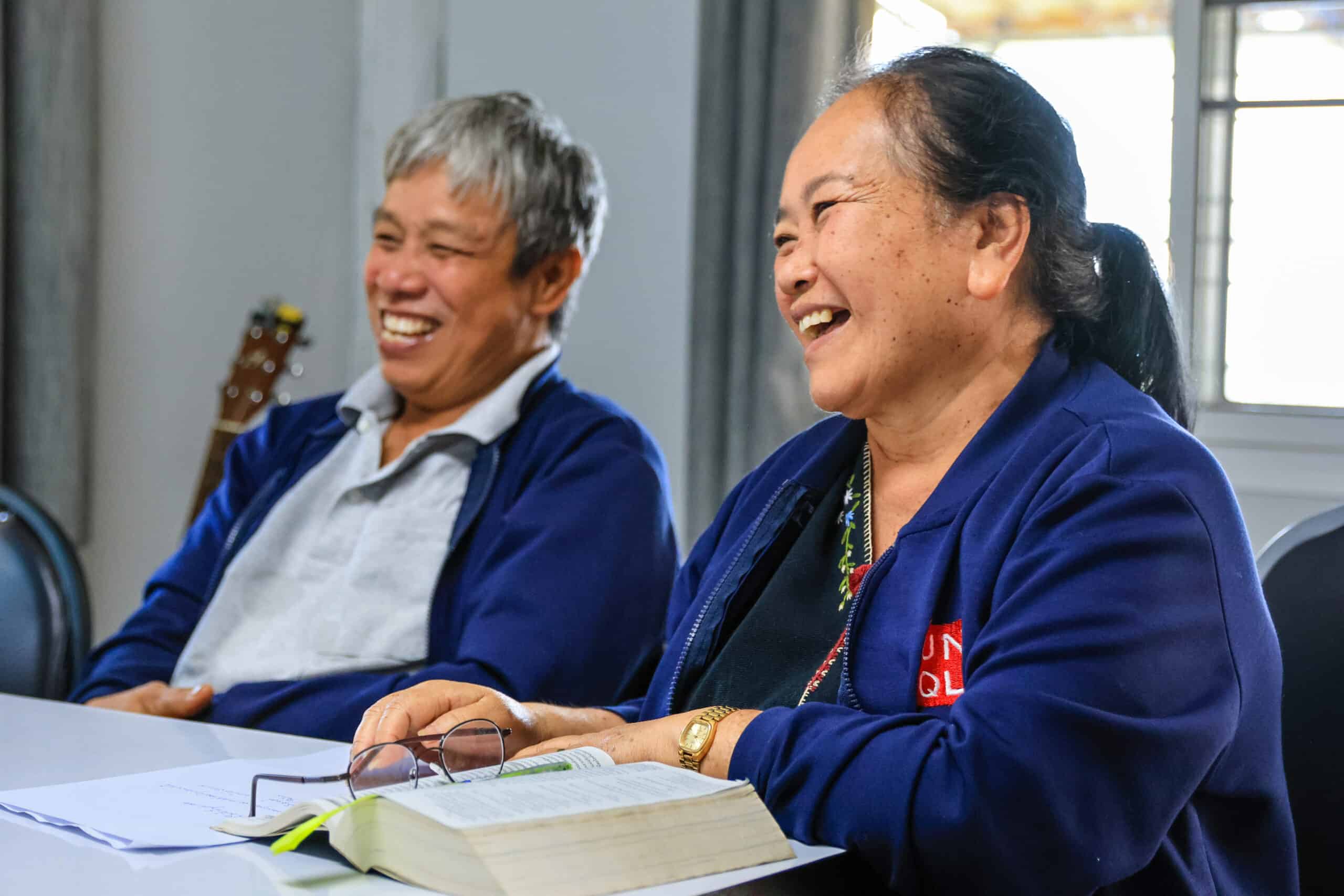
All photos by Derryl Friesen unless otherwise noted
Bam! The pickup truck smashed into the side of Tawan’s silver Toyota, sending it spinning across the pavement before it flipped into a ditch on the side of the winding mountain road. Tawan and his wife, Jum, hung from their seatbelts in stunned silence, one stacked on top of the other like sardines in a tin. The blood dripping from Jum’s ear looked ominous, and their uninsured truck was likely a write-off. They made eye contact with each other, and began to laugh. God was in control. He could redeem this.
The journey begins
Tawan’s journey to Christ began with a different truck, 25 years ago. He was a young man, then, newly married with two stepchildren and a baby on the way. He confesses now that back then, he was more fond of a good time than a good job, and his cheeky grin and twinkling eyes make this easy to believe. But he needed money for his growing family, so when a group of labourers offered him cash to drive them to the border of a neighbouring country to buy some livestock, he borrowed a friend’s truck and made the trip. It should have been a simple purchase, but Tawan waited for days for the group to return. When they finally arrived without any animals in tow, it seemed strange, but Tawan shrugged it off and started driving.
As they approached a police checkpoint near Tawan’s village, one of the men held a knife to his throat and ordered him to keep driving. Heroin—not livestock—had been the real goal of the trip, and they didn’t want to be caught with it. Tawan floored it, crashing through the barricade as the police opened fire on his pickup. They gave chase, so Tawan drove the truck off the main road and hurtled down a dirt track deep into the forest. All five men abandoned the truck and fled on foot into the darkness.
Tawan perched precariously in a tree all night, waiting to see if the police had discovered the vehicle. All was silent, so as the first light of dawn filtered through the leaves, he returned to his friend’s truck. Suddenly, flood lights blinded him and he was swarmed by cops. His protests of innocence were useless, and after a forced confession under torture, he was tossed into prison and sentenced to 33 years.
Tawan’s captivity
On his first day in jail, guards fitted Tawan with leg chains connected to a five kilogram ball. At night, they threaded a master chain through his leg chains and those of his 50 cellmates. Shifting positions was difficult, and the monumental act of rolling over required the co-operation of the entire group. Sometimes, prisoners would die while attached to the chains, and the guards wouldn’t remove their bodies until morning. Suicides were common, and as the days dragged on, Tawan contemplated ending his own life. An atmosphere of despair hung over the cell.

Tawan switched prisons six times with no notice, leaving Jum and their children unable to find him. But unbeknownst to them all, these moves were getting him to a place where he could meet Jesus. In his fourth prison, a new friend invited him to church services hosted by a visiting pastor.
“I was just interested in the things they brought as gifts,” chuckles Tawan, “soap and toothpaste and things.” But his heart was beginning to soften towards Jesus.
He received letters and small gifts of money from two overseas pen pals, British and American Christians who were committed to prison ministry. He skimmed the letters, eager for the cash, until one day, he saw a photo of his British pen pal. He’d expected her to be youthful and healthy. Instead, he saw an elderly woman sitting in a wheelchair, her body contorted with pain.
“My heart went ‘boom,’ through the floor,” Tawan says.
How could a woman dealing with so much of her own pain care enough to send letters and money to a convict in Thailand? It convinced him to become a Christian.
An unconventional church
Thai prisons aren’t typically equipped with baptismal tanks, so Tawan was immersed in a 200-litre drum. He began running a ministry to the lifers in jail for murder, and helped to lead church services. The guards, impressed by the Christian prisoners’ good behaviour, procured musical instruments, microphones, and speakers for the fledgling congregation. These acquisitions led to increasingly raucous worship services as well as the eventual segregation of the Christians from the other prisoners: their exuberant singing was disrupting the Buddhists’ meditation and the Muslims’ prayers.
One day during the seventeenth year of his sentence, Tawan was helping in the prison workshop when a guard abruptly released him. No fanfare, nothing. Overjoyed and distracted, he forgot to gather his belongings before he left, and soon found himself wandering the roads of a nearby village, frightening passersby with his prison garb. He was searching for the church that had visited him in prison. No one was willing or able to assist him, until finally a young boy agreed to walk with him to the church, where the pastor helped him get back to his own village.
It wasn’t a warm welcome: Tawan couldn’t find Jum and their children, and his village wasn’t interested in welcoming an ex-convict, particularly one who now identified as a Christian. The joyful release had become a dark and disorienting time.
Pigs and prison: Jum’s story
Meanwhile, Jum was languishing in jail herself. She was three-and-a-half years into her second sentence, and missing her children desperately. She wished that she and Tawan had made different choices in their lives.
“We [had been] still acting like teenagers,” she recalls. “No one really taught us right from wrong or a good way to conduct our lives, and so whatever felt good, we’d do it.”
It was this lack of direction that set her on a path leading to prison.
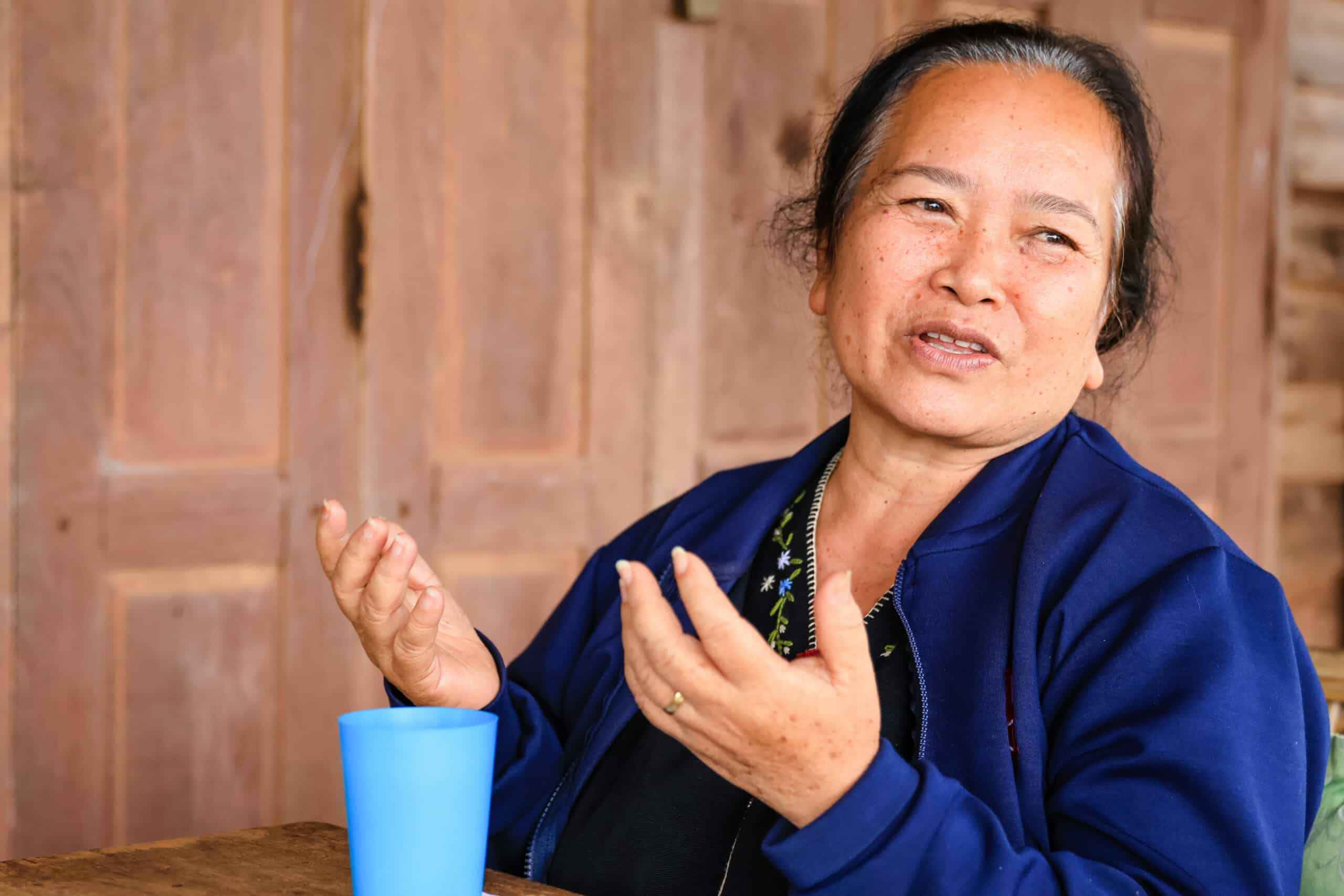
Tawan and Jum had tried to adhere to Buddhist principles, but found that the teachings were essentially a list of rules, not a source of true wisdom. So when Tawan was arrested and Jum was left to support not only their three children but also her younger sister and Tawan’s parents, she simply made the best guess she could at what would be lucrative. She settled on raising pigs and hired several labourers to help her. That’s when the trouble began.
Raising pigs isn’t for the faint of heart or body, and it wasn’t long before her workers were begging her to give them methamphetamines to help them work longer and harder. At first, Jum resisted their demands, but it wasn’t long before she caved in and gave them what they wanted. When her neighbours discovered that she was buying the pills, they asked her to purchase some for their workers as well—buying in bulk would save them all a lot of money. Jum was always happy to do favours for her neighbours, so why should she refuse to purchase drugs for them? Before she knew it, helpful Jum had become a bona fide drug dealer. When one of her clients was caught with the pills, Jum confessed her role to the police, hoping to spare him. Instead, they both received five-year jail terms.
The nightmare continues
When she was released at last, she was reunited with her kids, but soon found herself in the same impoverished position as before. This time, though, she had a reputation as an ex-convict, which didn’t exactly endear her to potential employers. Like a nightmarish form of déjà vu, her drug-dealing ordeal began all over again: she started raising pigs, she bought drugs for her workers, got busted, and was sent back to prison for five more years. It ripped her family apart a second time, and broke her children’s hearts.
Jum wept for her kids. They were staying with relatives and could visit her only when an adult was willing and could afford to take them. She felt the crushing weight of despair that Tawan had experienced during his own time in prison. But in the midst of her heartbreak, she began to see signs of hope in the jail. Some of her cellmates were Christians, and she noticed that they behaved differently than the other inmates. She was amazed to see that God actually answered their prayers. A seed was planted.
Reunited at last
Once Tawan discovered her location, he came to visit her. They hadn’t seen each other for 17 years, but he’d never stopped loving her. It was immediately clear to her that something in him had changed when he arrived bearing gifts: a beautiful platter of sliced mangoes that the previous Tawan would never have thought to bring. He’d arranged them himself.
“Jum didn’t believe that I had prepared all these lovely mangoes,” he laughs. “She thought I had another woman help me.”
Eighteen months later, Jum was released and they began the delicate dance of rebuilding their lives together. It became even more obvious to Jum that Tawan was truly different; he didn’t drink or party anymore, and he had purpose in his life. The change was so convincing that Jum decided to put her trust in Jesus, too. She now believes that her new faith was shallow, one that relied too heavily on Tawan’s Christian walk. But God was using even her stumbling baby steps, and the persecution coming their way would add steel to her convictions.
Walking through persecution
As Tawan and Jum began to live out their Christian faith, their fellow villagers increasingly opposed them. A vote was taken to kick them out of the village. Animist beliefs still grip the region, and the villagers worried that the presence of Christians would anger the spirits and cause them to lash out at everyone. Tawan appealed to a regional government official who confirmed that Thailand’s laws allow for freedom of religion; the village headman couldn’t oust them simply because they were Christians. It gave Tawan the leverage to take a stand.
“I said, ‘Look, if you want to buy my land, and my fields for 10 million baht [approx. 400,000 CAD] I’ll leave,’” he recalls.
But while they were grudgingly allowed to stay, some of their neighbours made things as difficult as possible for them. One scheming villager tried and almost succeeded in selling a piece of their land out from under them, using the complications of Thai real estate law to deed the property to a Buddhist organization intent on establishing a study centre in the area. It was only a two-year court battle that reversed the decision and gave Tawan back his land.
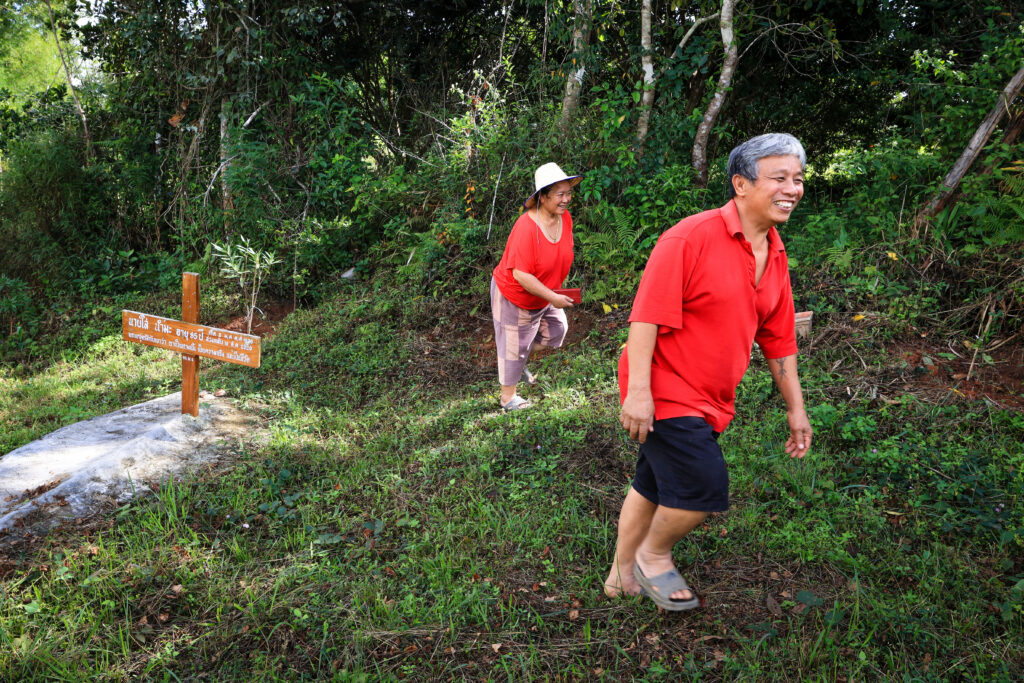
That hard-won land is where Tawan’s father, Tassai is now buried, his grave nestled alongside a banana orchard and marked with a cross. Tawan wasn’t allowed to bury him in the village cemetery, and the fundraising scheme that Tassai had started years ago in which the whole village pitched in to cover the exorbitant costs of every village funeral suddenly didn’t apply when it came to Christians.
A shift in the village begins
And then there are the smaller-scale injuries that Tawan and Jum experienced on a daily basis: the lack of eye contact, the broken friendships, the harsh words. But as the years pass, the prevailing attitude towards Christianity is slowly shifting because their neighbours have seen the kindness, generosity and peace in Tawan and Jum’s lives. The massive Christmas party that they host each year for 400-500 people on the tiny cement pad in front of their home has made important in-roads into the community. The work that they are doing to preserve the Lawa language is also helping in this process, and they are hopeful for a revival among the Lawa.
Their greatest sorrow right now is their son, Kaptan. Deeply wounded when his parents’ jail sentences left him abandoned as a child, he fell into depression and drug use, and refused to talk to them. But even in Tawan and Jum’s deep sadness, there is answered prayer: when they were terrified that Kaptan would commit suicide or overdose, they prayed that God would do whatever was necessary to stop him. Within a week, he was caught and taken to jail on drug possession charges. [He has since been released from prison on a misdemeanour charge and says that he has stopped using drugs.] You could view it as a tragic irony, given his parents’ history. But perhaps it’s an opportunity.
“This is beyond our capability to fix…” says Jum, “I’m still trusting God.”

Photo by Jum
Her gentle eyes tear up as she speaks about her beloved son. But you can also see the hard-won peace on her face. God is faithful. That knowledge changes everything, including the way that she and Tawan responded to a traffic accident caused by an impatient pickup driver.
The scene of the crash
On the side of the highway, Tawan and Jum extricated themselves from their smashed truck, and after confirming that they were indeed still in one piece, they went looking for the other driver. They found him nearby, standing sheepishly on the side of the road; it turns out that he lives in the village where they are translating the Bible. Instead of punching him as Tawan might have done in his pre-prison days, they wanted to make sure that he was unharmed. They even told him that they forgave him. He was touched, and shocked—in human terms, it didn’t make sense. But their response was shaped by their long experience of God’s grace in their lives. He is in control, and He will redeem all things. ∎
Field notes
Our group of three Canadians and two Kiwis pulled up to Tawan’s house, a modest cement structure on the side of the main road, and found ourselves in the middle of an Eastern Lawa celebration. It was one day after Tawan and Jum had survived their big car crash, and they were in the mood to celebrate. It was time to feast! The tables were groaning beneath a veritable smorgasbord of protein: chicken and pork and fish for grilling; stir-fried crab and shrimp and chicken wings and sausage and fish balls and those funny fake crab sticks that you can find almost anywhere in the world.
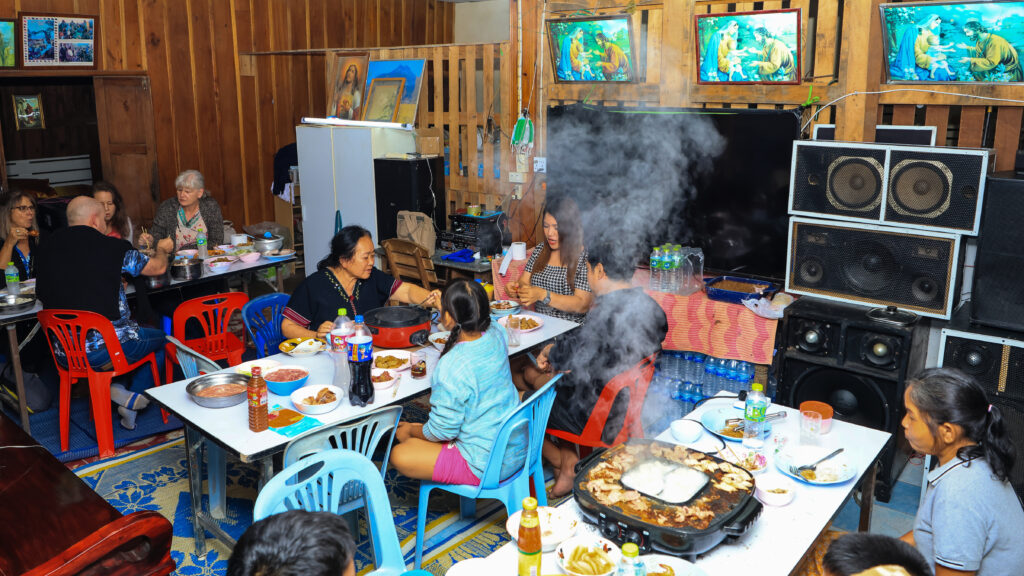
There were gallons of hot sauce and piles of leafy greens and bowls of fruit and oodles of noodles. We ate until we could eat no more. A guitar materialized, and soon anyone with an iota of musical talent was grabbing for it, songs ringing out in Lawa and Thai and English as everyone sang praises to Jesus. The dinner had originally been planned to welcome us to Eastern Lawa, but it had morphed into something better. “This is a celebration of victory over Satan!!” yelled Tawan, as he and Juum pumped their fists in the air. And it really was.
